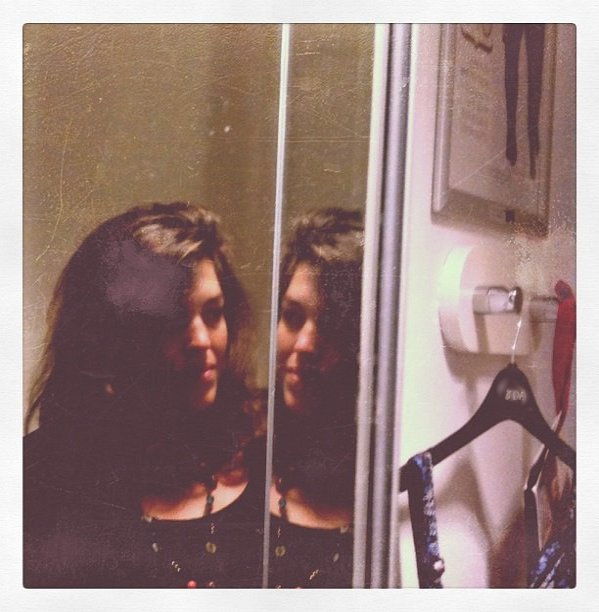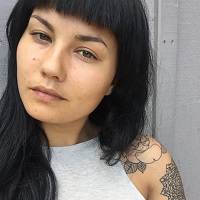
We search for homes in so many things—relationships, friendships, families, careers.
We try to create homes in houses that we construct from wooden boards and metal nails, from mortar and man-made bricks. We construct homes in the bodies of loved ones, in our families, our partners, our friends. We crave homes in our jobs; in the attainment of promotions, validations of our adequacy, something to tell us that we are doing fine where we are now.
We crave belonging, feelings of safety, having a life to reside in that fits perfectly around us, encasing us, affirming who we are.
We often look outside ourselves, forgetting that we are our primary homes—the resting place of our “self,” the one thing that remains fixed and constant throughout our ever-changing lives. We berate the body for gaining a few pounds, or losing a few pounds, or for having hair too long or too short, too straight, too curly, or for having limbs and muscles that won’t move in a certain way.
We castigate the body for not being the way we want, for not holding up the clothes we drape over ourselves in the way we have envisioned. We reproach the body, picking holes, pointing out rolls, pinching areas we wish were different. We view our bodies as another commodity, another material element in our repertoire of belongings which tell the story of who we are.
But our bodies are not another commodity in this world which is so commodity driven. Your waist and shoulders, your chest, your hips, your bum, your thighs, your stomach—none of these components that make up your body can be bought or sold.
Our bodies are first and foremost our homes, our only fixed and permanent homes. They are our lifelong residence. Our perpetual address.
Until now I had never been able to comprehend the enormity of this. My body was something I dragged around with me—I didn’t have a choice in the matter. It was there and sometimes I liked it and other times I did not.
Sometimes I took care of it, fed it, watered it, took it for walks and nurtured it, and sometimes I did not. Sometimes I abused it, stuffed it with drinks, drugs, men, junk food, feelings of hatred and inadequacy, and other times I did not.
Through both sides of body-hate and body-love, I still never truly understood what it meant to have a body and make a home for yourself inside it. It wasn’t until I went into recovery and started teaching yoga that I came to understand how much of a home I didn’t have within my body.
Today I awoke, in an off-ish mood, and dragged myself out of bed, grumpily unrolling my yoga mat on the floor. After half an hour of working my way through some sun-salutations and slightly overly-aggressive core strength exercises, I finally rolled over on my back and allowed myself to lie there and just breathe.
I closed my eyes, feeling the sensation of my breath as it tickled my nostrils, working its way down through my esophagus and into my lungs. I felt the rise and fall of my chest, the expansion and contraction of the ribs and the inflating and deflating of my stomach. I moved my legs into a cross-legged position and laid there with my hands resting on hips, palms touching my lower stomach, bearing witness to my body’s reaction to my slow inhalations and exhalations.
It was a beautiful moment—to lie in the body, to bring all my awareness inside, to focus on the breath and the space beneath my hands. As I lay there, just “being” with the body, it occurred to me that this was part of what it means to make a home for yourself within yourself, and that when you have this complete, secure and safe foundation—this ultimate perception of being “home”—everything else begins to matter less. Our fears lose their power when we know we have, and will always have, a home inside ourselves that we love and honour.
I recently began setting up a program that brings yoga into drug rehabilitation centres. Our preparatory discussion of what asanas (poses) and sequences we should use reminded me how much my view of body as home has changed over the past year. Addictive behaviours are all about getting outside of the body, of achieving non-existence, of trying not to feel, of using anything—whether it’s drugs, alcohol, food, shopping, gambling, sex or anything else—to escape the present.
As a person in recovery, I know I have to be with myself, be within my body and be present, every single day. But it wasn’t always easy; in my early days I ricocheted from self-hatred to rage to mania to depression and then back to elation, before starting the whole process again. Yoga soothed me, calmed me. Yoga helped me find peace amidst the whirlwinds of madness in my mind. It was through yoga and breath work that I became aware of myself, of my body, of sensations, and began slowly to hone my ability to still the mind and create a sanctuary within my skin.
And now, there is nowhere I’d rather be. Recovery forced me to be with myself; yoga taught me how to enjoy it. Yoga helped me make my body a home.
Today, my body is home. I enjoy being with it, I look after it, I admire it and give it compliments, and I treat it how it wants to be treated. Weight gain or weight loss has lost resonance with my ego because I know my body is so much more than just its outward appearance.
My body is the soft, squishy casing for my soul. My body is cherished, honoured and loved. My body is not bad or good. My body is, most importantly, home.
Author: Hannah Hilali
Image: kate hiscock/Flickr
Editor: Nicole Cameron






Read 0 comments and reply